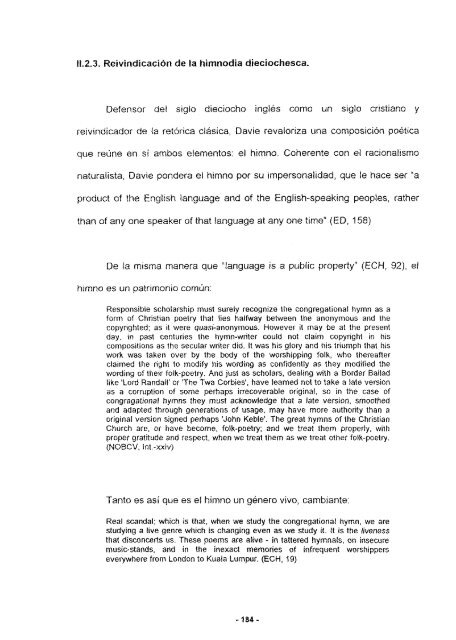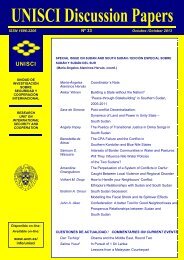- Page 1 and 2:
PENSAMIENTO CRITICO Y PRACTICA POET
- Page 3 and 4:
UNIVERSIDAD COMPLUTENSE DE MADRID F
- Page 5 and 6:
INDICE DEL TOMO PRIMERO AGRADECIMIE
- Page 7 and 8:
11.2.2.1.2. Oposiciones espontaneid
- Page 9 and 10:
111.3.6. Recapitulación y juicio c
- Page 11 and 12:
ibliográfica, contactos norteameri
- Page 13 and 14:
Londres; de la librería Blackwells
- Page 15 and 16:
a reestablecer la comunicación ent
- Page 17 and 18:
en el pensamiento literario de nues
- Page 19 and 20:
marco conceptual construido, pronun
- Page 21 and 22:
preceden, a la conclusión. Por lo
- Page 23 and 24:
A.1. SEMBLANZA. PRELIMINARES A. PRE
- Page 25 and 26:
A.2. EXPERIENCIAS FORMATIVAS. Podem
- Page 27 and 28:
sentimiento de distinción es asimi
- Page 29 and 30:
Este temor, en gran parte, es a lo
- Page 31 and 32:
En este sentido, la influencia de l
- Page 33 and 34:
Stokes, The Stones of Rim¡ni and T
- Page 35 and 36:
evuelta estudiantil de 1968 en Esse
- Page 37 and 38:
citada revista el critico Anthony H
- Page 39 and 40:
asado en Teoría de la Expresión P
- Page 41 and 42:
civilization over chaos, destructio
- Page 43 and 44:
A nivel comunitario, en la focaliza
- Page 45 and 46:
Poéticamente, ante esa pérdida de
- Page 47 and 48:
Frente a la pérdida del imperio pr
- Page 49 and 50:
pertenencia a ese grupo. De ahí el
- Page 51 and 52:
prometen and publicity; and it was
- Page 53 and 54:
PRIMERA PARTE: PENSAMIENTO CRITICO
- Page 55 and 56:
individualismo. Los primeros reacci
- Page 57 and 58:
te reveal te metaphor, the concrati
- Page 59 and 60:
are saying that the poet who undert
- Page 61 and 62:
function in a divine scheme” (ROO
- Page 63 and 64:
Davie, en esta línea de voluntad m
- Page 65 and 66:
logicismo, este prosaísmo se revis
- Page 67 and 68:
Fue, sin embargo, el movimiento al
- Page 69 and 70:
En el caso de la rima, sin embargo,
- Page 71 and 72:
En cuanto a la sintaxis matemática
- Page 73 and 74:
The Romantic Aga... ja ene of Iba m
- Page 75 and 76:
Si no se observan los términos del
- Page 77 and 78:
Este respeto al pasado se traduce e
- Page 79 and 80:
Estamos en una época que no busca
- Page 81 and 82:
la hora de escribir, en mediación
- Page 83 and 84:
Mencionado por Davie en POD 16, el
- Page 85 and 86:
concepción. explica el mismo Gar-c
- Page 87 and 88:
For the process works both ways: it
- Page 89 and 90:
convierte en un oficio al que se co
- Page 91 and 92:
medida en que la Biblia es código
- Page 93 and 94:
Si Cristo anunda el evangelio, el p
- Page 95 and 96:
(1983:102) señala que “liter-ary
- Page 97 and 98:
El conjunto de dogmas constituye, e
- Page 99 and 100:
principio y fuente de autoridad. El
- Page 101 and 102:
con-forma, mediante el yo, al super
- Page 103 and 104:
32 esencialmente, un símbolo fáli
- Page 105 and 106:
puede ser la que da el propio Davie
- Page 107 and 108:
of fictions, that is to say in the
- Page 109 and 110:
los datos hasta hacerlos entrar en
- Page 111 and 112:
instance, ‘raft’ring of my ribs
- Page 113 and 114:
Recapitulando, la estructura intern
- Page 115 and 116:
us’ (SEP, 135>. En poética esto
- Page 117 and 118:
metaforicidad (libre asociación>.
- Page 119 and 120:
Por tanto, ya no sois extranjeros y
- Page 121 and 122:
se equipara al resurgimiento de la
- Page 123 and 124:
La mediación es, en suma, la opera
- Page 125 and 126:
Resumiendo, la imbricación entre c
- Page 127 and 128:
2. Sustancialismo lingúistico. Dav
- Page 129 and 130:
hipostasiación de la razón como c
- Page 131 and 132:
Desligitimado así por ignorancia y
- Page 133 and 134: son un ejemplo de alterización: so
- Page 135 and 136: Por otra parte, dar primacía al me
- Page 137 and 138: justamente, la justificación ideol
- Page 139 and 140: poeta declara (TC, 169> (el subraya
- Page 141 and 142: la experiencia religiosa, a expensa
- Page 143 and 144: de la imposibilidad de realizar ext
- Page 145 and 146: forma, en el modernism, es más ide
- Page 147 and 148: análisis parcial. Desconocer esta
- Page 149 and 150: es el reflejo de una sociedad abier
- Page 151 and 152: abierta mientras que, en lo religio
- Page 153 and 154: misión como critico será vigilar
- Page 155 and 156: 11.2. EL SIGLO XVIII 11.2.1. Canoni
- Page 157 and 158: noción recibida de un “arcane ma
- Page 159 and 160: Frente a esta noción recién recib
- Page 161 and 162: destructora: ‘this Unitarian stra
- Page 163 and 164: admirable, something indeed that mu
- Page 165 and 166: arbitrariedad, el abuso de poder o
- Page 167 and 168: para configurar una visión de los
- Page 169 and 170: exclusiveness, its determination to
- Page 171 and 172: Por su parte, Valentine Cunningham
- Page 173 and 174: “there is no way for us to use ou
- Page 175 and 176: incluida “that natural philosophy
- Page 177 and 178: matter” (OM, 88-89). Nuestro auto
- Page 179 and 180: 11.2.2.11. Natura/eza y energía. E
- Page 181 and 182: XVIII, de determinadas característ
- Page 183: A esto cabe añadir la alterizació
- Page 187 and 188: Watts o Cowper. De Wesley advierte
- Page 189 and 190: modo, su impersonalidad, quedando i
- Page 191 and 192: La retórica —cuyo fin es maniput
- Page 193 and 194: Davie en esta línea, se refiere a
- Page 195 and 196: ansia por parte de Davie y su gener
- Page 197 and 198: Wordsworth, por ejemplo, entronca c
- Page 199 and 200: 11.3.1.4. Scott Por lo que a los pr
- Page 201 and 202: necassarily inferior. Sucb a brava
- Page 203 and 204: MASCULINO. . . FEMENINO 8-o UNIDAD
- Page 205 and 206: El examen del pensamiento davieano
- Page 207 and 208: Hopkins, además, participa de una
- Page 209 and 210: áreas se realiza, a nuestro juicio
- Page 211 and 212: que Davie no ve con muy buenos ojos
- Page 213 and 214: encounter when wa moya into underst
- Page 215 and 216: ¡n extenso>: rajad it. Soma of bis
- Page 217 and 218: our naighbors who sean lo ask nothi
- Page 219 and 220: admirable consistency indeed> for L
- Page 221 and 222: ouí. Sinca alí the other psycholo
- Page 223 and 224: 11.4.1.4. Juicio crítico En la pre
- Page 225 and 226: fuertemente autoritaria. De su car
- Page 227 and 228: socialismo, sino en el liberalismo.
- Page 229 and 230: irónico- resulta que ese inglés s
- Page 231 and 232: nuestro autor: “Moreover, contra
- Page 233 and 234: uptura de la tradición en Pound en
- Page 235 and 236:
(alterización) en un autor que se
- Page 237 and 238:
funny sed ob manifesto bacause -tho
- Page 239 and 240:
conformisrrio en defensa del nacion
- Page 241 and 242:
supone acabar con la idea del poema
- Page 243 and 244:
Asimismo, se ve en la proliferació
- Page 245 and 246:
“productos” (títulos, certific
- Page 247 and 248:
media de la sociedad postindustrial
- Page 249 and 250:
omanticismo, los años sesenta se v
- Page 251 and 252:
Sin embargo, “Bunting does not re
- Page 253 and 254:
switched to the more manageable bec
- Page 255 and 256:
Geoffrey Hill (1932-) es un poeta
- Page 257 and 258:
this intelbectually conternptible a
- Page 259 and 260:
nation shall seo itself as ¡fis, n
- Page 261 and 262:
En palabras de Cunningham (1996: 33
- Page 263 and 264:
Donald Davie, ante estas observacio
- Page 265 and 266:
III DAVIE COMO CRITICO DE LA LITERA
- Page 267 and 268:
1 will end by expressing two hinche
- Page 269 and 270:
canon que vertebre su continuidad y
- Page 271 and 272:
es calificada de egoísta y la segu
- Page 273 and 274:
systematizer, and En his last years
- Page 275 and 276:
places, wifil fhe self which, as Ef
- Page 277 and 278:
solidez de la tierra pétrea lucha
- Page 279 and 280:
George Oppen adopta una nueva retó
- Page 281 and 282:
Stevens, Eliot, Tate, Roethke, Berr
- Page 283 and 284:
importancia, incluso la mínima de
- Page 285 and 286:
El esquema básico de la transferen
- Page 287 and 288:
new think, is to make sure that the
- Page 289 and 290:
de Davie está el principio culus r
- Page 291 and 292:
históricos basados en fuentes pros
- Page 293 and 294:
A continuación pasamos a estudiar
- Page 295 and 296:
lengua, es decir, de la razón y, p
- Page 297 and 298:
94 POUND ELIOT . lmagist Simbolista
- Page 299 and 300:
La esculturalidad resultante de esp
- Page 301 and 302:
influential notion of tbe dissociat
- Page 303 and 304:
Análogamente, si en POD y AE habla
- Page 305 and 306:
objetivo (épica) se transforma as
- Page 307 and 308:
ilustrado lo que, a su vez, posibil
- Page 309 and 310:
En EP reitera este contraste: “th
- Page 311 and 312:
también en lo social, Pound cree e
- Page 313 and 314:
supone, además, la omisión result
- Page 315 and 316:
mean enly amateurishness En techniq
- Page 317 and 318:
Cabe, por otra parte, destacar la e
- Page 319 and 320:
attend te res not verba can be, and
- Page 321 and 322:
nature that we cali ‘human’.”
- Page 323 and 324:
Tras el ataque a la crítica contem
- Page 325 and 326:
Coke, al luchar contra el autoritar
- Page 327 and 328:
111.3.6. Recapitulación y juicio c
- Page 329 and 330:
IV DAVIE COMO CRITICO LITERARIO DE
- Page 331 and 332:
the framing of senfences” (SE, 13
- Page 333 and 334:
what we might mean, er what we ough
- Page 335 and 336:
IV 2 3 1 Sonoridad Comentando el pr
- Page 337 and 338:
The Poems of Doctor Zhivago son “
- Page 339 and 340:
Zukofsky” (SE, 256>. Al igual que
- Page 341 and 342:
together man v~dth man inside a hum
- Page 343 and 344:
feeling” (SE, 111) supone una inc
- Page 345 and 346:
Renan fue desplazado por el sentimi
- Page 347 and 348:
going for support fo the writings o
- Page 349 and 350:
La lírica, en cuanto tiene de expr
- Page 351 and 352:
international modernism but in the
- Page 353 and 354:
Considerados hasta aquí los aspect
- Page 355 and 356:
autor señala (1987: 737) que “co
- Page 357:
ABRIR TOMO II

















